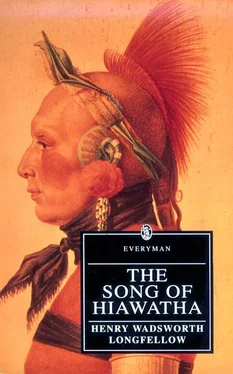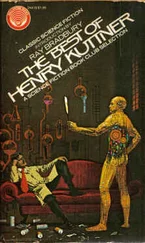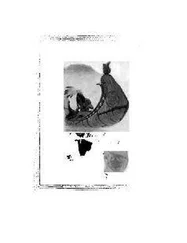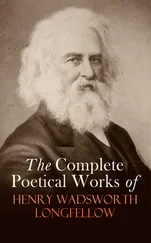Yes, the brook, the Sebowisha,
Pausing, said, "O Chibiabos,
Teach my waves to flow in music,
Softly as your words in singing!"
Yes, the bluebird, the Owaissa,
Envious, said, "O Chibiabos,
Teach me tones as wild and wayward,
Teach me songs as full of frenzy!"
Yes, the robin, the Opechee,
Joyous, said, "O Chibiabos,
Teach me tones as sweet and tender,
Teach me songs as full of gladness!"
And the whippoorwill, Wawonaissa,
Sobbing, said, "O Chibiabos,
Teach me tones as melancholy,
Teach me songs as full of sadness!"
All the many sounds of nature
Borrowed sweetness from his singing;
All the hearts of men were softened
By the pathos of his music;
For he sang of peace and freedom,
Sang of beauty, love, and longing;
Sang of death, and life undying
In the Islands of the Blessed,
In the kingdom of Ponemah,
In the land of the Hereafter.
Very dear to Hiawatha
Was the gentle Chibiabos,
He the best of all musicians,
He the sweetest of all singers;
For his gentleness he loved him,
And the magic of his singing.
Dear, too, unto Hiawatha
Was the very strong man, Kwasind,
He the strongest of all mortals,
He the mightiest among many;
For his very strength he loved him,
For his strength allied to goodness.
Idle in his youth was Kwasind,
Very listless, dull, and dreamy,
Never played with other children,
Never fished and never hunted,
Not like other children was he;
But they saw that much he fasted,
Much his Manito entreated,
Much besought his Guardian Spirit.
"Lazy Kwasind!" said his mother,
"In my work you never help me!
In the Summer you are roaming
Idly in the fields and forests;
In the Winter you are cowering
O'er the firebrands in the wigwam!
In the coldest days of Winter
I must break the ice for fishing;
With my nets you never help me!
At the door my nets are hanging,
Dripping, freezing with the water;
Go and wring them, Yenadizze!
Go and dry them in the sunshine!"
Slowly, from the ashes, Kwasind
Rose, but made no angry answer;
From the lodge went forth in silence,
Took the nets, that hung together,
Dripping, freezing at the doorway;
Like a wisp of straw he wrung them,
Like a wisp of straw he broke them,
Could not wring them without breaking,
Such the strength was in his fingers.
"Lazy Kwasind!" said his father,
"In the hunt you never help me;
Every bow you touch is broken,
Snapped asunder every arrow;
Yet come with me to the forest,
You shall bring the hunting homeward."
Down a narrow pass they wandered,
Where a brooklet led them onward,
Where the trail of deer and bison
Marked the soft mud on the margin,
Till they found all further passage
Shut against them, barred securely
By the trunks of trees uprooted,
Lying lengthwise, lying crosswise,
And forbidding further passage.
"We must go back," said the old man,
"O'er these logs we cannot clamber;
Not a woodchuck could get through them,
Not a squirrel clamber o'er them!"
And straightway his pipe he lighted,
And sat down to smoke and ponder.
But before his pipe was finished,
Lo! the path was cleared before him;
All the trunks had Kwasind lifted,
To the right hand, to the left hand,
Shot the pine-trees swift as arrows,
Hurled the cedars light as lances.
"Lazy Kwasind!" said the young men,
As they sported in the meadow:
"Why stand idly looking at us,
Leaning on the rock behind you?
Come and wrestle with the others,
Let us pitch the quoit together!"
Lazy Kwasind made no answer,
To their challenge made no answer,
Only rose, and slowly turning,
Seized the huge rock in his fingers,
Tore it from its deep foundation,
Poised it in the air a moment,
Pitched it sheer into the river,
Sheer into the swift Pauwating,
Where it still is seen in Summer.
Once as down that foaming river,
Down the rapids of Pauwating,
Kwasind sailed with his companions,
In the stream he saw a beaver,
Saw Ahmeek, the King of Beavers,
Struggling with the rushing currents,
Rising, sinking in the water.
Without speaking, without pausing,
Kwasind leaped into the river,
Plunged beneath the bubbling surface,
Through the whirlpools chased the beaver,
Followed him among the islands,
Stayed so long beneath the water,
That his terrified companions
Cried, "Alas! good-by to Kwasind!
We shall never more see Kwasind!"
But he reappeared triumphant,
And upon his shining shoulders
Brought the beaver, dead and dripping,
Brought the King of all the Beavers.
And these two, as I have told you,
Were the friends of Hiawatha,
Chibiabos, the musician,
And the very strong man, Kwasind.
Long they lived in peace together,
Spake with naked hearts together,
Pondering much and much contriving
How the tribes of men might prosper.
"Give me of your bark, O Birch-tree!
Of your yellow bark, O Birch-tree!
Growing by the rushing river,
Tall and stately in the valley!
I a light canoe will build me,
Build a swift Cheemaun for sailing,
That shall float on the river,
Like a yellow leaf in Autumn,
Like a yellow water-lily!
"Lay aside your cloak, O Birch-tree!
Lay aside your white-skin wrapper,
For the Summer-time is coming,
And the sun is warm in heaven,
And you need no white-skin wrapper!"
Thus aloud cried Hiawatha
In the solitary forest,
By the rushing Taquamenaw,
When the birds were singing gayly,
In the Moon of Leaves were singing,
And the sun, from sleep awaking,
Started up and said, "Behold me!
Gheezis, the great Sun, behold me!"
And the tree with all its branches
Rustled in the breeze of morning,
Saying, with a sigh of patience,
"Take my cloak, O Hiawatha!"
With his knife the tree he girdled;
Just beneath its lowest branches,
Just above the roots, he cut it,
Till the sap came oozing outward;
Down the trunk, from top to bottom,
Sheer he cleft the bark asunder,
With a wooden wedge he raised it,
Stripped it from the trunk unbroken.
"Give me of your boughs, O Cedar!
Of your strong and pliant branches,
My canoe to make more steady,
Make more strong and firm beneath me!"
Through the summit of the Cedar
Went a sound, a cry of horror,
Went a murmur of resistance;
But it whispered, bending downward,
"Take my boughs, O Hiawatha!"
Down he hewed the boughs of cedar,
Shaped them straightway to a frame-work,
Like two bows he formed and shaped them,
Like two bended bows together.
"Give me of your roots, O Tamarack!
Of your fibrous roots, O Larch-tree!
My canoe to bind together,
So to bind the ends together
That the water may not enter,
That the river may not wet me!"
And the Larch, with all its fibres,
Shivered in the air of morning,
Touched his forehead with its tassels,
Slid, with one long sigh of sorrow.
"Take them all, O Hiawatha!"
Читать дальше












